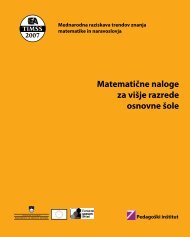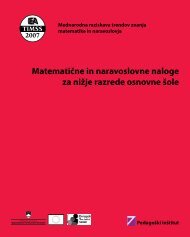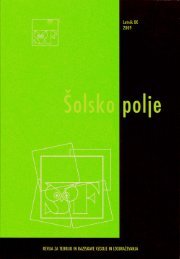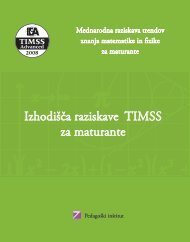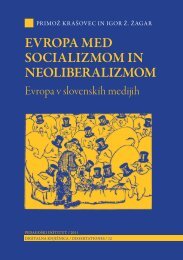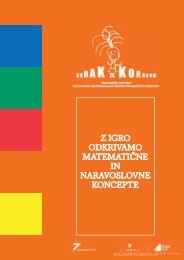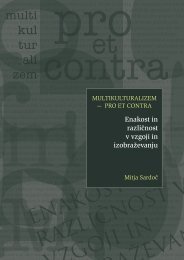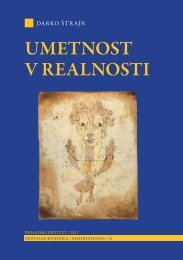78 ŠOLSKO POLJE LETNIK <strong>XX</strong> ŠTEVILKA 5/6ethnic cleansing, establishing concentration camps, destroying property,and massacring numerous sectors of the civilian population (97,207 civiliandeaths) (Population losses in Bosnia and Herzegovina 92-95, 2007).In his many public speeches Karadžić vigorously advocated the creationof a homogeneous Greater Serbia »by violence«, while he often skilfullyrelated to specific historical events where Serbs had been positioned as »betrayedvictims«. He used nostalgic practices, such as a constant focus on Serbian»old-centuries« warrior identity, as crucial mechanisms through whichthe very idea of »Serbianness« was reified. Karadžić was also well known forpublicly celebrating the crimes against the Bosniaks and Bosnian Croats,claiming these were committed in the name of Greater Serbia (MacDonald,2002). For example, on 15 October 1995 in RS parliament, Karadžić publiclystated that he does not regret the »radical mission« in Srebrenica anddefined the massacre as the »defence against the Turks« (Repe, 2008: 45). 5On December 14 1995, the Dayton Peace Agreement brought an end tothe Bosnian war and divided BH into two entities: the Federation of Bosnia-Herzegovina (with 51% of the territory) in which mostly Bosnian Muslimsand Bosnian Croats live, and Republic Srpska (with 49% of the territory)populated almost exclusively by the Bosnian Serbs. Ironically, as many pointout, the Agreement legalized Karadžić’s politics and his Serbian enclave,Republic Srpska (Repe, 2008). Today, this political entity is almost ethnicallypure, and functions as a state within a state, having its own parallel politicalinstitutions (Verdery and Burawoy, 1999). Karadžić succeeded where otherSerbian politicians had failed (i.e. Milošević) – he has, de facto, enlarged theterritory of Serbia while creating a Serbian state in BH. In that way he has atleast partially, realized the myth of Greater Serbia (Repe, 2008).During the arrest of Karadžić, the political situation in Serbia was tenseand deeply divided. For example, on July 29 2008 the demonstrations againstKaradžić’s arrest were organized by all nationalistic oppositional politicalparties, including the Serb Radical Party. The crowd of roughly 15,000members screamed and chanted his name, while singing »Karadžić is a heroof all heroes.« On Facebook, his advocates created various groups such as»Free Radovan Karadžić«, and »Freedom for Radovan Karadžić« to mobilizesupport. At the same time, death threats against the Serbian president BorislavTadić were waged, framing him as a Serbian traitor and Serb hater.
JOURNALISTIC (RE)PRODUCTION OF HISTORY: TELEVIZED COVERAGE OF RADOVAN ...79Theoretical backgroundCollective NostalgiaNostalgia has been often understood through medical metaphors. Stewart(1993) characterizes nostalgia as a social disease, and Boym (2001) sees nostalgiaas »the incurable modern condition« (xiv). The world nostalgia envisionsis different from what would be created only from collection of memories.Nostalgia can be experienced in private as well as in public spaces.According to Davis (1979: 122–123), private nostalgia is fuelled by particular,even intimate, personal memories of an individual; collective nostalgiarelies on collective/public images, symbols, and signs available tomany within the same historical and socio-cultural context. Collective nostalgiais available to larger communities (e.g. ethnic groups, nations) andis often used in order to forge a collective sense. As such, public nostalgiadwells in the content of the group’s history, and exploits the group’s culturalsymbols. In this sense it becomes possible that different symbols helpto trigger the nostalgic and nationalistic sentiment. For example, the Chetniks’(Serbian Serb nationalist guerrillas who fought against Nazi occupiersand Tito's partisans during the 2nd World War) iconography, frequentlydisplayed during public events, provoked nostalgia for Greater Serbia.Boym conceptualizes nostalgia into »reflective« versus »restorative«one. She defines »reflective« one as a more critical one, since it calls thetruth into doubt. In writing about nostalgia after the collapse of the SovietUnion, Boym argues that restorative nostalgia »attempts a transhistoricalreconstruction of the lost home,« while reflective nostalgia »thrives in algia,the longing itself, and delays the homecoming – wistfully, ironically,desperately« (xviii). Moreover, restorative nostalgia »does not think of itselfas nostalgia, but rather as truth and tradition,« while reflective nostalgia »rests on the ambivalences of human longing and belonging and does notshy away from the contradictions of modernity« (xviii). On one hand, areflective mode of nostalgia provides both a complicated emotional stateand a complex relation to history. Reflective nostalgia is based on culturalmemory, but it is concerned with individual and historical time. In thisway, reflective nostalgia allows for the endorsement of a specific identitynarrative characterized by personal memories of the collective history. Onthe other hand, restorative nostalgia occupies the sphere of those concernedwith reconstruction of the past in the sense of the restoration of originsand tradition (Boym, 2001: XV). In their extreme forms, the advocatesof restorative nostalgia are engaged in the »anti-modern myth-making of
- Page 3:
VSEBINA LETNIK XX ŠTEVILKA 5/6 Z
- Page 7 and 8:
UVODNA NOTICAIgor Ž. ŽagarTole pi
- Page 9 and 10:
ZA KAJ GRE V KAD - PREGLEDZGODOVINE
- Page 11 and 12:
ZA KAJ GRE V KAD - PREGLED ZGODOVIN
- Page 13:
ZA KAJ GRE V KAD - PREGLED ZGODOVIN
- Page 17 and 18:
ZA KAJ GRE V KAD - PREGLED ZGODOVIN
- Page 19 and 20:
ZA KAJ GRE V KAD - PREGLED ZGODOVIN
- Page 21 and 22:
ZA KAJ GRE V KAD - PREGLED ZGODOVIN
- Page 23 and 24:
ZA KAJ GRE V KAD - PREGLED ZGODOVIN
- Page 25 and 26:
ZA KAJ GRE V KAD - PREGLED ZGODOVIN
- Page 27 and 28:
DISKURZ: FOUCAULT, LACLAU TERZAPOPA
- Page 29 and 30: DISKURZ: FOUCAULT, LACLAU TER ZAPOP
- Page 31 and 32: DISKURZ: FOUCAULT, LACLAU TER ZAPOP
- Page 33 and 34: DISKURZ: FOUCAULT, LACLAU TER ZAPOP
- Page 35 and 36: DISKURZ: FOUCAULT, LACLAU TER ZAPOP
- Page 37 and 38: DISKURZ: FOUCAULT, LACLAU TER ZAPOP
- Page 39 and 40: DISKURZ: FOUCAULT, LACLAU TER ZAPOP
- Page 41 and 42: DISKURZ: FOUCAULT, LACLAU TER ZAPOP
- Page 43 and 44: DISKURZ: FOUCAULT, LACLAU TER ZAPOP
- Page 45 and 46: DISKURZ: FOUCAULT, LACLAU TER ZAPOP
- Page 47 and 48: DISKURZ: FOUCAULT, LACLAU TER ZAPOP
- Page 49 and 50: TOPOI IN CRITICAL DISCOURSE ANALYSI
- Page 51 and 52: TOPOI IN CRITICAL DISCOURSE ANALYSI
- Page 53 and 54: TOPOI IN CRITICAL DISCOURSE ANALYSI
- Page 55 and 56: TOPOI IN CRITICAL DISCOURSE ANALYSI
- Page 57 and 58: TOPOI IN CRITICAL DISCOURSE ANALYSI
- Page 59 and 60: TOPOI IN CRITICAL DISCOURSE ANALYSI
- Page 61 and 62: TOPOI IN CRITICAL DISCOURSE ANALYSI
- Page 63 and 64: TOPOI IN CRITICAL DISCOURSE ANALYSI
- Page 65 and 66: TOPOI IN CRITICAL DISCOURSE ANALYSI
- Page 67 and 68: TOPOI IN CRITICAL DISCOURSE ANALYSI
- Page 69 and 70: TOPOI IN CRITICAL DISCOURSE ANALYSI
- Page 71 and 72: TOPOI IN CRITICAL DISCOURSE ANALYSI
- Page 73 and 74: TOPOI IN CRITICAL DISCOURSE ANALYSI
- Page 75 and 76: TOPOI IN CRITICAL DISCOURSE ANALYSI
- Page 77 and 78: University of Queensland, Centre fo
- Page 79: JOURNALISTIC (RE)PRODUCTION OF HIST
- Page 83 and 84: JOURNALISTIC (RE)PRODUCTION OF HIST
- Page 85 and 86: JOURNALISTIC (RE)PRODUCTION OF HIST
- Page 87 and 88: JOURNALISTIC (RE)PRODUCTION OF HIST
- Page 89 and 90: JOURNALISTIC (RE)PRODUCTION OF HIST
- Page 91 and 92: JOURNALISTIC (RE)PRODUCTION OF HIST
- Page 93 and 94: JOURNALISTIC (RE)PRODUCTION OF HIST
- Page 95 and 96: JOURNALISTIC (RE)PRODUCTION OF HIST
- Page 97 and 98: JOURNALISTIC (RE)PRODUCTION OF HIST
- Page 99 and 100: JOURNALISTIC (RE)PRODUCTION OF HIST
- Page 101 and 102: JOURNALISTIC (RE)PRODUCTION OF HIST
- Page 103 and 104: THE VOICE OF AN AGENDA-SETTINGAUTHO
- Page 105 and 106: THE VOICE OF AN AGENDA-SETTING AUTH
- Page 107 and 108: THE VOICE OF AN AGENDA-SETTING AUTH
- Page 109 and 110: THE VOICE OF AN AGENDA-SETTING AUTH
- Page 111 and 112: THE VOICE OF AN AGENDA-SETTING AUTH
- Page 113 and 114: THE VOICE OF AN AGENDA-SETTING AUTH
- Page 115 and 116: THE VOICE OF AN AGENDA-SETTING AUTH
- Page 117 and 118: THE VOICE OF AN AGENDA-SETTING AUTH
- Page 119 and 120: THE VOICE OF AN AGENDA-SETTING AUTH
- Page 121 and 122: THE VOICE OF AN AGENDA-SETTING AUTH
- Page 123 and 124: THE VOICE OF AN AGENDA-SETTING AUTH
- Page 125 and 126: THE VOICE OF AN AGENDA-SETTING AUTH
- Page 127 and 128: THE VOICE OF AN AGENDA-SETTING AUTH
- Page 129 and 130: THE VOICE OF AN AGENDA-SETTING AUTH
- Page 131 and 132:
THE VOICE OF AN AGENDA-SETTING AUTH
- Page 133 and 134:
THE VOICE OF AN AGENDA-SETTING AUTH
- Page 135 and 136:
‘68 KOT HKRATNA KRIZA EVROPSKEGAZ
- Page 137 and 138:
‘68 KOT HKRATNA KRIZA EVROPSKEGA
- Page 139 and 140:
‘68 KOT HKRATNA KRIZA EVROPSKEGA
- Page 141 and 142:
‘68 KOT HKRATNA KRIZA EVROPSKEGA
- Page 143 and 144:
‘68 KOT HKRATNA KRIZA EVROPSKEGA
- Page 145 and 146:
‘68 KOT HKRATNA KRIZA EVROPSKEGA
- Page 147 and 148:
‘68 KOT HKRATNA KRIZA EVROPSKEGA
- Page 149 and 150:
‘68 KOT HKRATNA KRIZA EVROPSKEGA
- Page 151 and 152:
‘68 KOT HKRATNA KRIZA EVROPSKEGA
- Page 153 and 154:
‘68 KOT HKRATNA KRIZA EVROPSKEGA
- Page 155 and 156:
‘68 KOT HKRATNA KRIZA EVROPSKEGA
- Page 157 and 158:
‘68 KOT HKRATNA KRIZA EVROPSKEGA
- Page 159 and 160:
POVZETKI/ABSTRACTSZA KAJ GRE V KAD
- Page 161 and 162:
POVZETKI / ABSTRACTS159NOVINARSKA (
- Page 163 and 164:
POVZETKI / ABSTRACTS161‘68 AS PAR
- Page 165 and 166:
AVTORJI/AUTHORSRuth WodakRuth Wodak
- Page 168 and 169:
166 ŠOLSKO POLJE LETNIK XX ŠTEV
- Page 170 and 171:
168 ŠOLSKO POLJE LETNIK XX ŠTEV
- Page 172:
ZAHVALARevija Šolsko polje izhaja




